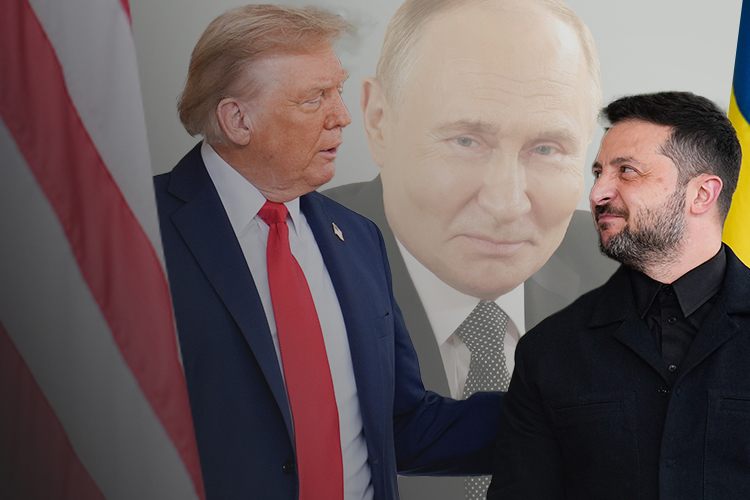Trump and Putin Prepare to Meet Ahead of Zelensky’s White House Visit: A New Phase of Diplomacy or Pressure on Kyiv?

U.S. President Donald Trump and Russian President Vladimir Putin held a lengthy phone conversation lasting more than two hours. Sources claim that the two leaders discussed prospects for a new “peace process” on Ukraine and tentatively agreed to meet in Budapest in the coming weeks – just days before Ukrainian President Volodymyr Zelensky is scheduled to visit the White House.
According
to reports, the initiative for the contact came from the American side. During
the discussion, they addressed issues of security, nuclear control, prisoner
exchanges, and – most notably – the situation in Ukraine.
“We spoke very openly. I think we can do something good for all sides”, Trump said after the call, without providing details.
Putin,
for his part, stated that “the U.S. must stop adding fuel to the fire” if
Washington truly wants peace, and once again warned of “unpredictable
consequences” from supplying Ukraine with long-range missiles.
The
conversation between Trump and Putin took place just days before Zelensky’s
planned visit to Washington, where a new package of military aid to Ukraine is
expected to be discussed. According to Western analysts, the phone contact
between the U.S. and Russian leaders may
represent Moscow’s attempt to seize the diplomatic initiative – signaling
that any decisions made by Washington will be viewed by the Kremlin as
pressure, not support.
Meanwhile,
the White House insists that the conversation with Putin is “part of
international diplomacy”, not a shift in U.S. policy.
The
choice of Budapest as the
possible meeting venue is not accidental. Hungarian Prime Minister Viktor Orban has long been an ally of
Donald Trump and remains one of the few European leaders to maintain a neutral
or soft stance toward Moscow.
Thus,
Budapest offers a convenient platform where Putin can appear without the threat
of international arrest warrants – while maintaining the appearance of a
neutral setting.
Kyiv’s
reaction has been cautious. Zelensky’s press office stated that “any
negotiations without Ukraine’s participation cannot be considered real peace
initiatives”. Moscow, on the other hand, views the conversation as “a positive
signal” and a chance to “reset” relations with the United States.
The
European Union and NATO have expressed concern. Officials
in Brussels fear that such moves by Trump could “undermine” the West’s united
stance on Ukraine.
The Trump-Putin phone call marks the first extended dialogue between the two leaders since Trump’s return to the White House. Yet, more important is the timing: the discussion coincides with a period when the U.S. and Europe are debating whether to continue their costly military support for Kyiv. According to experts, Trump is using the situation to portray himself as a “peacemaker” – someone capable of negotiating with Putin where Biden failed. Moscow, meanwhile, is seeking to legitimize itself as an equal participant in peace talks rather than as a belligerent party. This diplomatic maneuver may mark the beginning of a new phase of a “cold peace”, in which Moscow and Washington attempt to define the limits of the acceptable – possibly without involving Kyiv in key decisions. The Trump-Putin conversation is not merely a diplomatic episode. It is a signal that the architecture of war and peace in Europe may once again be rewritten – but this time without the old rules.
 Latest news
Latest news Latest news
Latest newsTrump: New bonds of friendship to join Armenia to Azerbaijan
14.Oct.2025
UK to lift its arms embargo on Armenia, Azerbaijan
14.Oct.2025
Russia Opens New Criminal Case Against Opposition Figure Khodorkovsky
14.Oct.2025
Expert analysis by Tigran Khzmalyan: If Pashinyan wins again, Armenia will fall completely under Russia’s influence
14.Oct.2025
The Kremlin Warns the West of Dangerous Escalation: U.S. Plans to Supply Tomahawk Missiles to Ukraine
12.Oct.2025
Moscow Admits Guilt for Downing Azerbaijani Plane: Putin and Aliyev Show “Mutual Understanding of Authoritarian Allies”
10.Oct.2025
Kazakhstan to Fully Transition to Digital Governance: Tokayev Announces Creation of New Ministry
10.Oct.2025
State Duma Denounces Plutonium Disposal Agreement with the United States
09.Oct.2025
U.S. Congressmen Propose Sanctions Against Azerbaijan in Case of New Aggression Against Armenia
08.Oct.2025
Russia Intensifies Strikes on Ukraine’s Energy Sector: Major Thermal Power Plant Damaged
08.Oct.2025

 19 Oct 2025
19 Oct 2025








